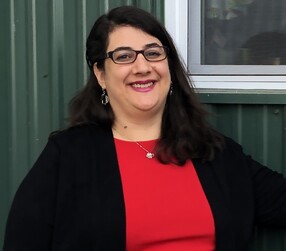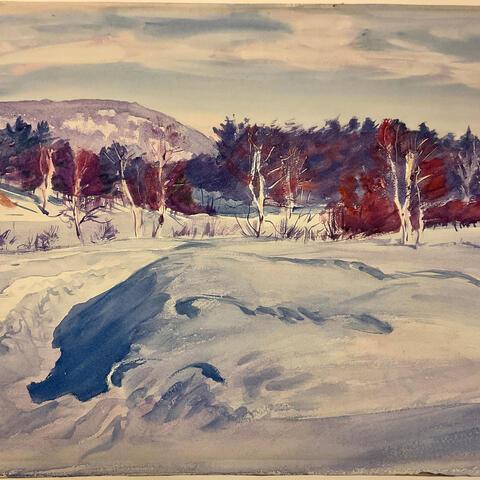Leading Fellows
The leadership of the new Fellowships and Writing Center comes into focus with the appointment of Executive Director Jeannette Miller and five outstanding postdoctoral fellows.
The launch last summer of the GSAS Fellowships & Writing Center (FWC) brought big changes to the way the School organizes support for students looking for help with writing and the fellowships process. Now the leadership of the center is coming into focus with the appointment of Jeannette Miller as the FWC’s executive director.

“Jeannette Miller is a scholar and administrator with extensive experience running a competitive fellowships program,” says Noël Bisson, assistant dean of academic programs. “At her previous position as associate director of the National Fellowships Program at Johns Hopkins, she worked closely with writing tutors and staff and helped engineer a fellowship program that enabled students not only to secure funding but also to develop skills and knowledge that transcend the application process. She will be a wonderful addition to the GSAS leadership team.”
The executive director is a new position created by the merger of the GSAS Fellowships Office and the Center for Writing and Communicating Ideas. Bisson says that, under Miller’s leadership, the new center will develop joint programming and address student needs in a more coordinated way.
“GSAS has served great numbers of students over the years at both the writing center and the fellowships office,” she says. “Over time, we recognized that students who came for help would benefit from the services of both offices at the same time. Writing is central to the fellowship process. On the other hand, students who have developed a relationship with someone at the writing center should be able to continue to work with that person on their fellowship application. Jeannette’s job will be to continue to bring those functions together, working with staff who have particular expertise in the area of writing.”
Miller, who holds a PhD in French & Francophone Studies from The Pennsylvania State University, says that she accepted the position at GSAS with “great enthusiasm.” She’s already developing a vision for the FWC and looks forward both to managing the center and to working with students one-on-one.
“I’m really excited to work with and get to know GSAS students, whether through individual tutoring sessions or the rich slate of workshops and programming that the FWC will offer,” Miller said in an interview with GSAS Communications. “I love learning about a variety of academic projects and students’ motivations for pursuing their dissertation topics while helping them to express themselves with more clarity and confidence. Through its growth mindset approach, I hope that the FWC will be a space where students improve their written expression skills from their first semester at Harvard until they defend their dissertation as they take advantage of its resources to heighten the impact of their research.”
While Miller brings great experience with fellowships to her new role, the FWC’s writing staff will continue to offer robust support for writers. The center will soon appoint an interim director of writing in the wake of the departure of long-time and much-loved director Suzanne Smith. In the meantime, the new executive director and current tutors will be joined by five outstanding postdoctoral fellows, all 2020 GSAS alumni: Katie Callam, Armin Fardis, Sam Klug, Anna White-Nockleby, and Janet York. Funded by the School’s Emergency Support Initiative, which helps PhD students overcome academic disruptions caused by the COVID-19 pandemic, the fellows have a talent for writing and a passion for working with others.
...my hope is that the FWC will be a space where students improve their written expression skills from their first semester at Harvard until they defend their dissertation as they take advantage of its resources to heighten the impact of their research.
“One of the most valuable experiences for me in graduate school was talking with someone one-on-one about writing,” says White-Nockleby, whose PhD is in romance languages and literatures. “I feel like those have been some of the most exciting intellectual experiences that I've had on a personal level. So, I want to help students to think about their work, to see the value in it, and to look at it in positive ways. It’s such a privilege to be part of someone’s process like that.”
Klug, who studied history at GSAS, says that he wants to work with students in the first years of their program to help them think about publishing.
“Graduate students need to learn how to turn a seminar paper into an article,” he says, “or how to navigate the differences between material that you want both in a dissertation chapter and an article. It's about framing things differently to serve a different purpose. That's something that a writing center can help students address.”
Fardis, who did his doctoral work in the Department of African and African American Studies, says that he sees his role as creating a collaborative space for fellow writers to discover and express ideas that excite and interest them.
“As graduate students, we often think that the person that's helping us is supposed to be above us,” he says. “It’s someone who has a skill that we don't have. But often in a writing group, we're all operating at some similar levels of comprehension. So, I hope to encourage students to seek out others as a way of developing their own writing mechanisms.”
York, who has a PhD in English and American literature and language, says that a group approach to writing practice also enables students to bring together different pieces of advice that might otherwise seem disjointed.
“Individualized writing advice can sometimes seem fragmented,” she explains. “It takes time to absorb and process it and to put it into practice. The great thing about the Fellowships & Writing Center is that we can present suggestions a little more holistically, particularly in groups. A good writing process is often a lot more social than we think.”
After spending years studying for her PhD in music, Callam says that one of the things she most looks forward to as an FWC fellow is the encounter with work in many different subject areas.
“There are so many amazing projects that scholars across GSAS are working on,” she says. “I’m excited to be able to tap into those and get a little sampler of all the amazing work that's going on at the School.”
Bisson says that Miller and the new fellows will enable GSAS to expand support for students whether they’re seeking funding for their work, writing dissertations or papers, or simply looking to develop their communication skills.
“I’m thrilled to see the team that’s come together at the FWC,” she says. “Jeannette Miller is a dynamic leader who will leverage the merger of fellowship and writing services to create vital new programming. This year’s fellows will allow us to meet the increased demand for writing support precipitated by the pandemic and the move to remote teaching and learning. I’m looking forward to seeing how the new leadership and staff at the center will empower students and enrich their experience at the GSAS.”
Get the Latest Updates
Join Our Newsletter
Subscribe to Colloquy Podcast
Simplecast





